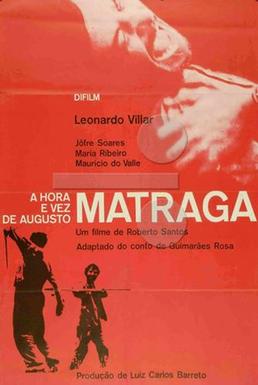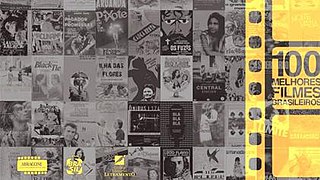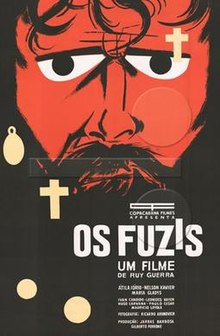Roberto Santos Pinhanez (1928–1987) was a Brazilian film director, known for films like Matraga and The Great Moment.

The War of Canudos was a conflict between the First Brazilian Republic and the residents of Canudos in the northeastern state of Bahia. It was waged in the aftermath of the abolition of slavery in Brazil (1888) and the overthrow of the monarchy (1889). The conflict arose from a millenarian cult led by Antônio Conselheiro, who began attracting attention around 1874 by preaching spiritual salvation to the poor population of the sertão, a region which suffered from severe droughts. Conselheiro and his followers came into attrition with the local authorities after founding the village of Canudos. The situation soon escalated, with Bahia's government requesting assistance from the federal government, who sent military expeditions against the settlement.

Norma Aparecida Almeida Pinto Guimarães d'Áurea Bengell was a Brazilian film, stage and television actress, singer-songwriter, screenwriter and director. She appeared in several episodes of T.H.E. Cat, the first being in 1966 episode “To Kill a Priest”.

Canção do Amor Demais is 1958 album by Elizete Cardoso. It is often considered the first bossa nova album, and contains the first recordings of João Gilberto's guitar beat, which would go on to become a staple of bossa nova. Gilberto played guitar on "Chega de Saudade" and "Outra Vez".

Ruy Alexandre Guerra Coelho Pereira is a Portuguese-Brazilian film director and screenwriter. Guerra was born a Portuguese citizen in Lourenço Marques in Mozambique, when it was still a Portuguese colony.

Leonardo Villar was a Brazilian actor. He became internationally known for his performance as Zé do Burro in Anselmo Duarte's O Pagador de Promessas, the only Brazilian film so far awarded a Palme d'Or at the Cannes Film Festival.

The Hour and Turn of Augusto Matraga is a 1965 Brazilian crime drama film directed by Roberto Santos, based on the short story of the same name by João Guimarães Rosa.

Hugo Carvana de Hollanda was a Brazilian actor and film director. He appeared in more than 110 films and television shows between 1954 and 2014.

The 14th annual Berlin International Film Festival was held from 26 June to 7 July 1964.

Átila Iório was a Brazilian actor of Calabrese descent. He appeared in 48 films and television shows between 1946 and 1997. He starred in the 1964 film Os Fuzis, which won the Silver Bear Extraordinary Jury Prize at the 14th Berlin International Film Festival.

Nelson Agostini Xavier was a Brazilian actor. He appeared in more than 95 films and television shows between 1959 and 2017. He starred in the 1964 film Os Fuzis, which won the Silver Bear Extraordinary Jury Prize at the 14th Berlin International Film Festival.
A Queda is a 1976 Brazilian drama film directed by Ruy Guerra and Nelson Xavier. It was entered into the 28th Berlin International Film Festival, where it won the Silver Bear - Special Jury Prize.

Flávio Migliaccio was a Brazilian actor, film director and screenwriter. He appeared in more than 90 films and television shows between 1958 and 2019. His 1962 film The Beggars was entered into the 3rd Moscow International Film Festival. His elder sister Dirce Migliaccio was also an actress.

Fábio de Souza Lago is a Brazilian actor, best known for his works in Elite Squad, Caras & Bocas, and Invisible City.

In 2015, the Brazilian Film Critics Association (Abraccine) published a list with the 100 best Brazilian films ever according to the votes of its members. This poll was the basis for a book named The 100 Best Brazilian Films, published in 2016. The idea of the ranking and the book was suggested by publisher Letramento, with whom Abraccine and television network Canal Brasil co-released the book. The ranking was done based on individual lists done by Abraccine's 100 critics, who initially mentioned 379 films. The full list was first made available to the public on 26 November 2015, and the book was released on 1 September 2016.
Maria Gladys Mello da Silva, known as Maria Gladys, is a Brazilian actress.
"The Third Bank of the River" is a short story written by João Guimarães Rosa, published in his book Primeiras Estórias, in 1962.
Ruy Alberto Duarte Gomes de Carvalho was an Angolan author and filmmaker, whose work, which over more than three decades spanned poetry, metafiction, and anthropology, focused on the Kuvale people of the southern Angola. Writing for Carvalho's entry in the Dictionary of African Biography (2012), Livia Apa commented that even if "In their complexity, Ruy Duarte de Carvalho's works are some of the most interesting and original works in contemporary Portuguese literature. Curiously, in spite of its importance, his work is rarely translated or taught abroad. Only a few of his books have been recently published in Brazil, and most of his films have disappeared, or been lost or badly damaged." Since 2016, some of the films he directed between 1975 and 1989 can be watched online at RDC Virtual.

Cecil Aldary Portocarrero Thiré was a Brazilian television, film and stage actor, and director.

Solano Trindade was a Brazilian poet, actor, folklorist, painter, stage director and activist. Trindade was active in the Brazilian Black Movement, having founded or co-founded several popular theater and art initiatives, such as the Teatro Popular Brasileiro company.















